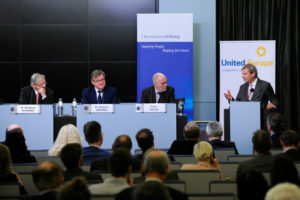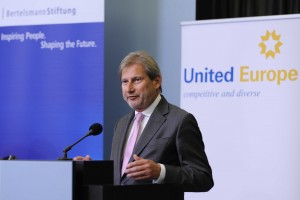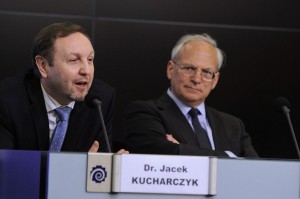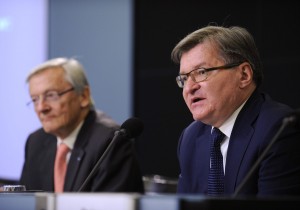
Once upon a time, Ukraine and Poland weren’t all that different. When the Soviet Union collapsed in 1991, Ukraine was only lagging slightly behind Poland in term of average income. It was also much more richly endowed with natural resources. Yet a quarter century later, the gap between both countries has become enormous.
While Poland has created remarkable growth and prosperity, production in Ukraine has dropped by a third. As a result, Ukrainian GDP per capita now is only a third of what it is in neighbouring Poland. Of course, the war in Eastern Ukraine is doing enormous damage to the economy. But the roots of Ukraine’s deep economic malaise go much deeper.
What did Poland do better? How can Poland’s experience be transferred to Ukraine? What role for Europe? Those were three key questions animating a high-level debate on economic reform in Ukraine hosted by United Europe and the Bertelsmann Stiftung on April 15th in Brussels. The event was introduced by Joachim Fritz-Vannahme, Director of the Bertelsmann Stiftung’s Programme Europe’s Future.
A different path
“Ukraine is a rich country,” said Wolfgang Schüssel, president of United Europe and member of the Board of Trustees of Bertelsmann Stiftung. “It had better soil, a good industrial base, less foreign debt. Ukraine had a much better starting point than Poland. The question now is: how do we create a new starting point for Ukraine?”

In his keynote speech, Johannes Hahn, the European Commissioner in charge of European Neighbourhood Policy and Enlargement Negotiations, addressed the same issue. “I have always asked myself: why Ukraine is not more like Poland, or other Eastern European nations?” Hahn said.
“Change in Poland required political will and tough choices, and cooperation between political parties, government and Parliament,” the Commissioner added. “It required technical capacity and teams able to work over sustained periods on seeing work through. It required wide support throughout society. We know that Ukraine has taken a different path.”
A state capture by oligarchs
In his analysis, Hahn referred to a new study on Ukraine drawn up by the renowned Vienna Institute for International Economic Studies (wiiw) on behalf of United Europe. Two of the authors of the study “How to Stabilise the Economy of Ukraine” attended the Brussels conference in order to explain their findings. Most importantly, they warned against expecting any quick fixes. Even if the conflict in Eastern Ukraine could be contained, little economic growth could be expected before 2017.
“The major Polish lesson is that economic prosperity was associated with deep reforms on legal and constitutional matters,” the study says. In contrast to Poland, the Ukrainian state had captured by oligarchic interests. “Arguably, as long as Ukraine is ruled by oligarchic interests, the chances of a successful major institutional and legal overhaul seem low.” According to the Viennese think tank, elections results in Ukraine – including the most recent ones – suggest that comprehensive political change is yet to come.
“Ukraine must find the courage to reinvent itself”

In the study, wiiw put forward detailed recommendations for the Ukrainian institutions, the country’s European partners and for the international community at large. Under the crucial assumption that peace can be restored in Eastern Ukraine, they aim at putting Ukraine on the path to sustainable growth. “Ideally, we would have something like a Marshall Plan for Ukraine with more funds, but also strict conditionality and insistence on political, legal and economic reforms,” said Michael Landesmann, one of the authors of the study.
“The challenges in our Eastern neighbourhood are a test of Europe’s unity and resolve,” Commissioner Hahn said. “But as in all such cases, it is above all Ukraine itself that must find the will and the courage to reform and reinvent itself (…) The EU will try to play its part in ensuring that Ukraine does not lack the means to change, if it has the will.” Since the pro-democracy demonstrations on Kiev’s Maidan square in late 2013, the EU had mobilized financial assistance and grant aid worth six billion euro for Ukraine, Hahn added.
Disagreement over trade with Russia
With more than a hundred participants from EU institutions, diplomatic missions, think tanks and the media, interest in the Ukraine event in Brussels’ Residence Palace was considerable. There was one wiiw recommendation in particular that led to a particularly heated dispute: the Vienna institute advised against concentrating solely on Ukraine’s economic relations with the European Union. Given the deep structural differences between the industrialised east and the more agrarian west of the country, Ukraine also needed to try and re-establish trade with Russia and its other Eastern neighbours.

It was the Ukrainian member of the panel, Hryhoriy Nemyria, who passionately warned against banking on trilateral trade agreements between the EU, Russia and Ukraine. Nemyria, a former deputy prime minister who now serves as chairman of the Human Rights Committee of the Ukrainian Parliament, spoke of the death toll of the Maidan demonstrations in late 2013. There, many people had given their lives to support for Ukraine’s association with the EU, he said. “This is the road map,” he said. A red line would be crossed if any trilateral agreements were to diminish the usefulness of the EU accords.
The pull of Europe
Jacek Kucharczyk from the Institute of Public Affairs in Warsaw was equally skeptical of any attempts to restore trade with Russia. Poland’s experience after the collapse of the Soviet Union had been that the decoupling from the East was painful, but ultimately opened the way to better economic development. “Reducing trade with Russia also means reducing the potential of blackmail by our ‘big brother’,” he added.
According to this Polish expert, the main reason why Poland succeeded with its economic transition and Ukraine didn’t was the perspective of EU membership. “It was not divine intervention but European integration,” Kurcharczyk said. “This is what kept difficult reforms on track in Poland. This is what has been missing from the debate in Ukraine.”
United Europe gratefully acknowledges the financial support for the wiiw report “How to Stabilise the Economy of Ukraine” by the Austrian Central Bank, Bertelsmann Stiftung, DER-think tank, ING Bank NV and Raiffeisen Bank International AG.
Photos: Philippe Veldeman


